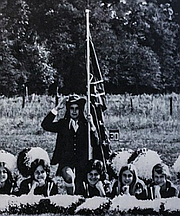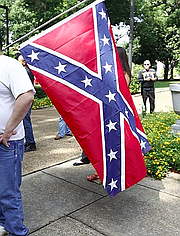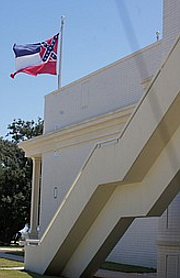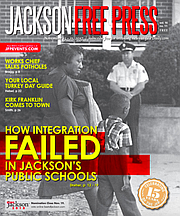Both candidates for Mississippi Senate District 37, Republican Melanie Sojourner (left) and Democrat Will Godfrey (right), come from Natchez-area backgrounds that include slave plantations and segregation-era private schools. Photos courtesy Melanie Sojourner/Will Godfrey
Sandra Sojourner was driving her daughter, Melanie, to school early one morning in mid-1970s Mississippi when the young white child saw something alarming at a major intersection in Adams County: a giant wooden cross engulfed in flames. The girl, who attended a local Southern Baptist church and was about 8 or 9 years old at the time, did not know what it meant, but she immediately recoiled, thinking it was “an attack on Jesus.”
“Melanie, it’s just bad people doing bad things,” her mother told her, continuing the drive to Adams County Christian School in Natchez—an all-white private academy where Confederate imagery was then part of its students’ everyday tapestry.
Sojourner, now age 51 and the Republican candidate to reclaim the Mississippi Senate seat she lost in the 2015 election, told the Jackson Free Press on Oct. 24 that she did not know as a young girl that the school she attended had been organized as a segregation academy at a time when white parents pulled their children out of public schools in response to court-ordered integration.
Hyde-Smith Attended All-White ‘Seg Academy’ to Avoid Integration
The story that created a national dialogue on school segregation, then and now.
“And it wasn’t until later that I learned that the ‘bad people doing bad things’ were white people being ugly to black people,” she said. “It wasn’t until much later that I realized that those ‘bad people doing bad things’ used the same flag my school used.”
Rebels and Saints
Sojourner’s Democratic opponent in the Mississippi Senate District 37 race, Will Godfrey, is also white and attended a private school in Adams County, he told the Jackson Free Press on Oct. 22. He graduated from Trinity Episcopal Day School in 2005—19 years after Sojourner—and said there were no Confederate flags at that school. Adams Christian today uses the Rebels as a mascot, while the mascot at Trinity Episcopal Day School, which shut down in 2018, was the Saints.
Still, Godfrey realized while researching civil rights in college that his alma mater likely functioned as a segregation school for some white families in the area during integration, too, he said.
“It wasn’t directly founded (as a segregation academy), but I’m sure it was expanded for that reason like so many other schools,” he said.
In 1969, Trinity Episcopal Church voted to open Trinity Episcopal Day School—the same year as the 1969 Alexander v. Holmes ruling that forced public schools to integrate immediately. Over Christmas break that year, segregation academies popped up all over the state as white parents rushed to pull their children from public schools. Adams County Christian School opened in January 1970. Trinity Episcopal expanded that year and graduated its first class in 1971.
Sojourner said she had “no idea” that Adams County Christian’s founding “might be based on white kids or black kids,” but she does remember “desperately” wanting to go to the public school.
“They had the band and dance line, and I had so many friends over there," she said. "They were all a part of the dance team, and I was just like, ‘We don’t have that in my high school.'"
In the 2000s, Sojourner had been living and working in Colorado when she moved home to Natchez. She then enrolled her children at the private school she once attended.
“It was just familiar. There's a large number of African Americans at our private school now,” she said. “They're friends with our kids, and our kids are friends with them."
The National Center for Education Statistics reported in 2012 that Adams County Christian’s student makeup was 93% white and 3% black.
Her grandmother was a charter member at the local Calvary Baptist Church, which she said was “instrumental in pulling our school together.”
All but one of Adams County’s 17 Baptist churches played a role in the school’s founding. In his 2007 book, “In Search of Another Country: Mississippi and the Conservative Counterrevolution,” historian Joe Crespino corroborates Sojourner’s account.
"Local churches in small Mississippi towns were often the only institutions that had facilities in which a school could actually be run. In other instances, local churches played a central organizing role. In Adams County, Mississippi, the Baptist churches organized the system of private schools and received large donations from wealthy residents in the area," Crespino wrote.
Trinity Episcopal and Adams County Christian Schools were both members of the Mississippi Private School Association at the time. Members of the segregationist White Citizens' Council "doubtless" played a role in its founding in 1968, Crespino wrote in his book. In 2009, MPSA changed its name to the Midsouth Association of Independent Schools, or MAIS.
The Jackson Free Press has broken several stories about segregation academies in recent years. In 2017, Robert Luckett wrote about current Gov. Phil Bryant’s time at a Citizen Council segregation school in Jackson in the early 1970s. That same year, Arielle Dreher reported on how integration failed in Jackson public schools with the help of “seg academies.” During last November’s U.S. Senate race, this reporter broke the news that U.S. Sen. Cindy Hyde-Smith switched schools after the court’s forced integration in 1969, moving to the whites-only Lawrence County Academy, which opened its doors in 1970.
Confederates Speak
In their own words, Confederate leaders explain secession, the Civil War and their views about black people.
‘It Was a Working Plantation’
Segregation-era private schools, though, are not the only historical commonalities Sojourner and Godfrey share. On her social-media biography, Sojourner alludes to the fact that she is part of the sixth generation raised on one of “Mississippi’s oldest family-owned and continuously operating family-farms”—the 500-acre Oakwood Plantation in southeast Adams County, where she and her father today run a commercial cow business.
“It used to be a slave plantation, right?” the Jackson Free Press asked.
“It was a working plantation, it was,” Sojourner replied. “And it wasn’t this massive plantation like so many in Mississippi were, but of course like most properties in the 1800s, there were slave workers that lived on the farm.”
Natchez was a vital area for cotton production in the 19th century, and its Forks of the Road slave market became one of the biggest in the country after Congress banned the importation of slave labor in 1807. The site helped expand the slave trade further across the country in the decades leading up to the Civil War.
Godfrey said he has traced his family back seven or eight generations in Mississippi and that their story is similar. “My family also had a lot of acreage, lots of property, and lots of slaves here as well,” he said.
Sojourner said her family is in the process of turning a large number of family records over to the University of Southern Mississippi’s archives. Though she does not currently have access to those files, she said they include files showing that her great-great-great grandfather, Hardy Sojourner, signed an amnesty contract that allowed Oakwood’s former slaves to continue living on the plantation as sharecroppers.
In his 2008 book, "Slavery By Another Name," Washington County, Miss., native Douglas A. Blackmon wrote that sharecropping often foisted its own set of horrors on former slaves, in some cases tying them to the land under the watch of unscrupulous landowners. Post-Civil War laws in the Deep South criminalized many work options for African Americans, often leaving them with little or no choice. This often resulted, he wrote, in situations similar to slavery, with people at time forced into “servitude” and bound in chains as part of “chain gangs.”
Sojourner said her family's records, though, do not indicate the kinds of "horrors" she has seen in other plantation records.
Black families continued to live at the Oakwood Plantation long after the Civil War’s end, she said. She remembers at least one family that her grandfather, former Adams County Supervisor Boyd Sojourner, let live on the plantation until they decided to move in the 1980s. Members of that family, she said, still get together with hers to fish, cook out and share stories yearly, she said.
The Klan and the Burning Car at Oakwood
Boyd Sojourner’s decision to let black families live on the land drew the ire of local white supremacists, she said in a followup conversation on Oct. 25. The Natchez and Adam County area would become known as the heart of Klan nation for violence against black people in the 1960s. That included the murders of Henry and Charles Moore in 1965, a case the Jackson Free Press’ work helped re-open leading to the prosecution of James Ford Seale, and the bombing murder of Wharlest Jackson in 1967. In addition, the area had lesser-reported but strong black resistance to Klan violence, including the Deacons for Defense.
I Want Justice, Too: Re-opening KKK Cold Cases in Mississippi
Investigation by Donna Ladd and Kate Medley of 1964 murders that sent an old Klansman to prison
Then there was Ben Chester White.
On a cold, wet October day, Sojourner said she was looking from her house to a spot where, 53 years ago, her grandfather found a new ’66 Chevrolet aflame on his property just after midnight. It belonged to White, a 67-year-old African American man who had a job at a plantation in town.
Earlier that evening, three white drunken klansmen had shot him more than a dozen times in his car before dumping his body and setting the car on fire in Sojourner’s drive. They hoped the killing would lure Martin Luther King Jr. to Natchez so they could assassinate him. The murder went under the national radar, though, and King never showed up.
The next morning, though, someone made an anonymous phone call to a Natchez operator to report that Boyd Sojourner had killed a black man the night before, Stanley Nelson’s 2016 book, “Devils Walking: Klan Murders Along the Mississippi in the 1960s,” recounts. That was a lie, though; the caller had been Claude Fuller, one of the three klansmen. Just a few weeks earlier, Fuller had threatened Boyd Sojourner, telling him “to get the Negroes off his place.”
“My father was serving at the time in Vietnam and the Klan at the time did not like the fact that my grandfather was kind to the African American community,” Melanie Sojourner told the Jackson Free Press. “There was a large family of African American blacks that lived on the farm here. … We loved them like family. The Klan did not like that.”
That same month, in June 1966, 31-year-old Bob Dearing was looking for a ride to Jackson one day when local Sheriff Odell Anders told him he was on his way to Hazlehurst. Anders said he would drop him off there so he could hitchhike the remainder of the way to the capital city.
Anders, though, took a detour on the way and drove to Port Gibson, the Concordia Sentinel reported. Once there, the sheriff stopped by the county jail to pick up a prisoner.
“This is Mr. Jones," Anders told Dearing when he emerged with the prisoner. "He’s just turned state’s evidence in the Ben Chester White killing.”
James Jones confessed that he was one of the klansmen involved in White's murder. He told investigators that Fuller fired 15 to 18 bullets into White's body. Then, the third accomplice, Ernest Avants, fired a final shot, blowing the man’s head off. Avants himself confessed to an FBI agent. Despite that, a State of Mississippi jury acquitted him.
In 2003, after the other klansmen had died, Sojourner’s grandmother, historian and genealogist Dorothy Seale Sojourner, testified in Jackson on her husband’s behalf in the federal trial that would finally send Avants, who was 72 by then, to prison for White’s murder. Boyd Sojourner had died in 1999.
“I just remember at the time that occurred, my grandmother was so scared, she was so afraid. She hated everything about segregation and about the division, but at the same time she did want to tell the story about why she felt her family was targeted,” Melanie Sojourner said.
Despite her family’s deep ties to Mississippi’s dark past, though, Sojourner still does not agree with removing all of its Confederate imagery.
‘I Support Us Keeping Our Flag’
In 2015, Sojourner shared a photograph on Facebook from her 1985 homecoming, showing herself wearing a white dress and turned toward a man wearing a white coat and black slacks. Behind the Adams County Christian School Homecoming Queen and her father, Jack Sojourner, stood a white float with a Confederate flag at its center and the words “Glory Days” underneath.
Mississippi Flag: A Symbol of Hate or Reconciliation?
The Mississippi Sons of Confederate Veterans are fighting hard to keep the state flag to honor the Confederacy. Others are fighting back.
In high school, she and others would “run around the field and wave the (Confederate) flag,” unaware of the pain it evoked for African Americans (some of whose ancestors had worked as slaves under the ownership of her ancestors), she said.
“We never, like in a million years, thought we were doing anything offensive,” Sojourner told the Jackson Free Press. “I had white friends, I had black friends, and nobody ever said anything about our school’s mascot being offensive to anyone. I never had any of the kids there or my black friends say anything about it. … I don’t remember any of these conversations about it being offensive.”
She said she can understand now why African Americans take offense at the Confederate flag and at Mississippi’s state flag, which bears the Confederate emblem in its canton.
“But that’s everything in life,” she said. “Lots of people I know are offended by my religion, and I may not understand other people’s religion. I think that’s part of a free society. … I would certainly never want to do anything to hurt someone else’s feelings, but at the same time, I often hear lyrics on the radio that are offensive to me so I quickly turn the channel.”
When a white supremacist with an affinity for the Confederate flag murdered nine black churchgoers in Charleston, S.C., in 2015, the University of Mississippi and the University of Southern Mississippi permanently removed the state flag from their flagpoles. A number of cities also took their flags down.
After UM’s flag came down, though, Sojourner wrote on Facebook in October 2015 that she was “saddened at the disrespect thriving in our state by the ‘politically correct’ crowd,” pointing out that 64% of Mississippi voters opted to keep the current flag design in a 2001 referendum. She pledged that, if voters re-elected her a week later, she would work on legislation to “mandate that ALL public buildings must fly the flag.”
Sojourner never had the chance to pursue that legislation, versions of which have died in committee in the years since. Democrat Bob Dearing, the same man who rode with Anders to take Jones into custody for White's murder, beat her to reclaim his Senate seat—which Sojourner had usurped in 2011. He decided to retire this year rather than run for re-election.
Sojourner told the Jackson Free Press that she stands by her support for the current flag.
“I stand by the vote of the people, and I support us keeping our flag,” she said. “Now, if the people choose to vote again and vote on something different, I’ll respect their wishes.”
While he did not share as much about his own family history as his Republican opponent, Godfrey said he disagrees with her on the flag, which the Legislature adopted in 1894 as it worked to override gains black Mississippians had made since the end of the Civil War.
“I think that there are a lot of things that hold us back, and obviously there are things that we continue to fight over,” Godfrey said. “Why don’t we just have a flag that unites us all? I do think we should change it. She does not.”
The Democratic candidate, though, said he has not spent a lot of time thinking about his own family history as a candidate for office.
“It’s not something I talk about or post about on Facebook, I guess,” he said. “It’s not something I’ve even thought about during the campaign. … I’m trying to obviously focus on my race and talk about things I think are important in our state.”
Candidates Agree on Funding Public Ed, Disagree on Vouchers
One of those issues is public education. Despite his past as a private-school student, improving public education is a top issue for Godfrey.
“I think that for southwest Mississippi, or for Mississippi in general, to improve our outlook, we have to invest in our young people and that means doing everything we can to provide the best possible education for our kids so more will be proud of the communities they come from and the schools they come from,” he said. “That will make them more likely to come back home one day. Because otherwise, right now, we’ve got a situation where too many of our kids are leaving.”
Sojourner also said she considers public education a top issue. She wants to prioritize getting more money into the classroom, including teacher pay, instead of increased administrative spending.
She and her fellow private-school alumnus differ, though, when it comes to the State’s private-school voucher program. When she was last in the Senate, she voted for the Education Scholarships Program, which now provides $5 million yearly in taxpayer funds to pay tuition for some special-needs children to go to private schools.
Godfrey disagrees with the program.
“I think our public schools are underfunded as it is, and our teachers aren’t paid nearly enough,” he said.
If she had her way, though, Sojourner would extend the voucher program to make it accessible for all families.
How Integration Failed in Jackson’s Public Schools from 1969 to 2017
What you may not know about how Jackson's public schools were forced to integrate, followed immediately by thousands of white families fleeing schools, based largely on back science.
“I support having more choice, parents having more choice,” she said.
When it comes to the voucher program, it is hard to miss some historical parallels. When segregation academies were going up in the 1960s and ‘70s, Mississippi leaders implemented a voucher program to help white parents pay to send their kids to private schools.
But Sojourner said she genuinely has concerns for special-needs children, and she also wants more “school choice” when it comes to public schools. Children should be able to cross district lines for a better education, she said. Her sister was a dyslexia student in the 1970s and ‘80s. Back then, the law allowed her to go to school across district lines in Franklin County, which had a dyslexia therapy program—an option Sojourner said her family did not have at the public or private schools in Adams County.
“Everybody agreed that it was not good for her to be here, and the private school didn’t meet her needs, so why not give the flexibility for kids to go to schools that meet their needs?”
In the past two years, the Parents Campaign told the Jackson Free Press earlier this year, the Legislature underfunded special-needs education by over $55 million.
Godfrey said that, while he is not fixated on his own history in the campaign, he feels a responsibility to fight for policies that make life better for everyone.
“We are born into this world, and it’s up to us to do the best we can with what we are given,” he said. “I have worked hard to understand and learn from our history and that has led me to a deep commitment to represent every every Mississippian—regardless of race, creed or gender. As Dr. King once said, ‘We may have all come on different ships, but we’re in the same boat now.’”
Follow Jackson Free Press State Reporter Ashton Pittman on Twitter @ashtonpittman. Send tips to [email protected]. Read more stories about segregation academies at jfp.ms/segacademies.
More like this story
More stories by this author
- Governor Attempts to Ban Mississippi Abortions, Citing Need to Preserve PPE
- Rep. Palazzo: Rural Hospitals ‘On Brink’ of ‘Collapse,’ Need Relief Amid Pandemic
- Two Mississippi Congressmen Skip Vote on COVID-19 Emergency Response Bill
- 'Do Not Go to Church': Three Forrest County Coronavirus Cases Bring Warnings
- 'An Abortion Desert': Mississippi Women May Feel Effect of Louisiana Case







